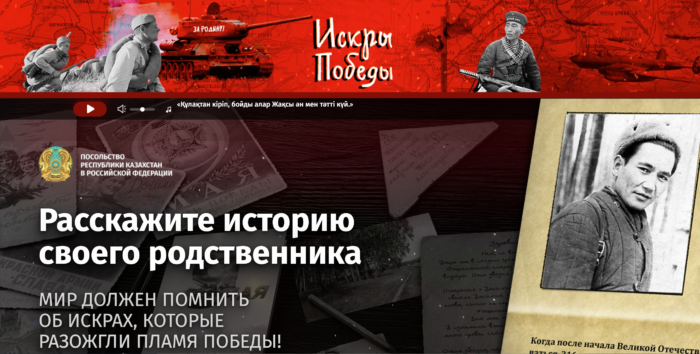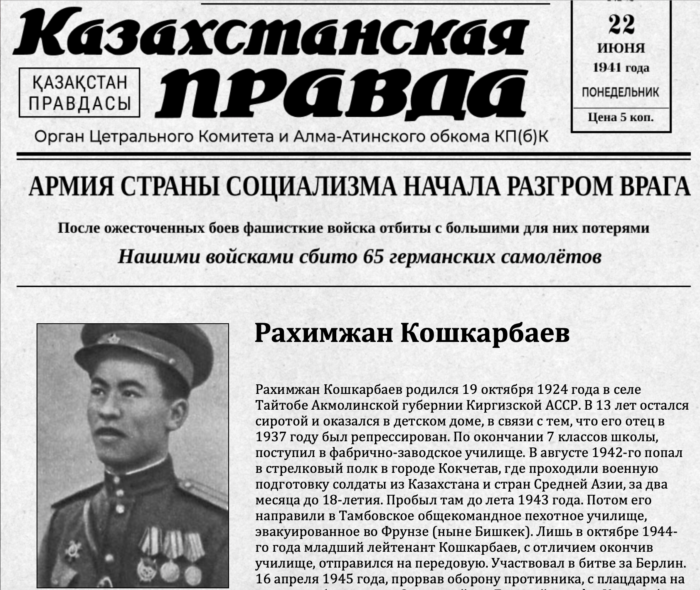Iskra Pobedy (Spark of Victory) – is the name given to a new internet project dedicated to the 75th anniversary of the Soviet Union’s Victory in the Great Patriotic War. The site https://iskry-pobedy.ru/ was created with the support of the Embassy of Kazakhstan in Russia and aims to collect information about the natives of Kazakhstan who fought on the various fronts of the Great Patriotic War, as well as about workers on the homefront. Thanks to the project, a public data bank will be created that will preserve the memory of Kazakh soldiers. The site has a Search function which allows you to “find a hero in the database by their name and surname.”

The main page of the Iskra Pobedy website features the photo of Hero of the Soviet Union and People’s Hero of Kazakhstan Bauyrzhan Momyshuly.
“The goal of the project is to form a base of heroes, to collect a complete information bank of the people who worked together towards a common victory in the war against fascism. This is a new digital project that allows you to create a story with a graphic design and gives users the opportunity to share it on all their social networks with friends and acquaintances. Everyone will be able to tell the story of their loved ones, get acquainted with the invaluable contribution and exploits of the heroes in the Great Patriotic War, with the help of modern digital technologies,” says the Iskra Pobedy website. “Living images, the harsh truth about the war, the bitterness of losses that does not pass over the years – all this will become that light of memory, the spark that kindles the fire of patriotism, that allows you to believe and win in the most terrible battles and wars. The world must remember the sparks that kindled the flame of Victory!”

The website also contains the archival materials about Rakhimzhan Koshkarbaev, who was one of the first soldiers to raise the Soviet Flag at the Reichstag building in Berlin.
In the first months of the Great Patriotic War, 1.2 million residents of Kazakhstan were drafted into the ranks of the Red Army, in addition to the 178,000 who had already served in the army by that time. Seventy percent of the male population of the country at the age of 18 to 50 went to the front. Half of those mobilized – 610,000 – would never return home. 12 rifle, four cavalry divisions, seven rifle brigades and about 50 separate regiments and battalions consisted entirely of people from Kazakhstan, including the legendary Panfilov division, which distinguished itself during the battle of Moscow.
Soldiers and officers called up to the front from Kazakhstan defended the Brest Fortress, took part in the battle for the Soviet capital Moscow and in the defense of Leningrad, in the battles near Rzhev and the Battle of Kursk. Kazakh divisions and units participated in the liberation of Belarus, the Baltic states, Moldova, Ukraine and the countries of Eastern Europe. The people of Kazakhstan stormed Berlin and participated in hoisting the Victory Banner over the Reichstag.
Thousands of residents of the republic also became partisans. In the Leningrad region, more than 200 Kazakh partisans fought against the invaders, in the Smolensk region – about 300, on the territory of Ukraine and Belarus, 3,000 immigrants from the republic were killed by enemies. After the war on the Western front was concluded, Kazakh soldiers fought with the Kwantung Army of Japan.
For courage in the battles of the Great Patriotic War, 500 Kazakh soldiers became Heroes of the Soviet Union, four Kazakhs received the title of Hero of the Soviet Union twice. Some 200 natives of the Kazakh SSR became full holders of the Orders of Glory. The well-known Hero of the Soviet Union, sniper Aliya Moldagulova, who died in 1944 at the age of 18 during a battle near Pskov, graces several streets in Moscow and St. Petersburg, as well as a Moscow primary school.
In an interview shortly before the celebration of the 75th anniversary of the Victory, Kazakh President Kassym-Jomart Tokayev pointed out that nine out of 10 bullets fired in the war were cast from lead produced in Kazakhstan. During the war years, 460 factories and mines were built in the republic. Kazakhstan also sheltered millions of Soviet citizens evacuated from the areas of hostilities.
